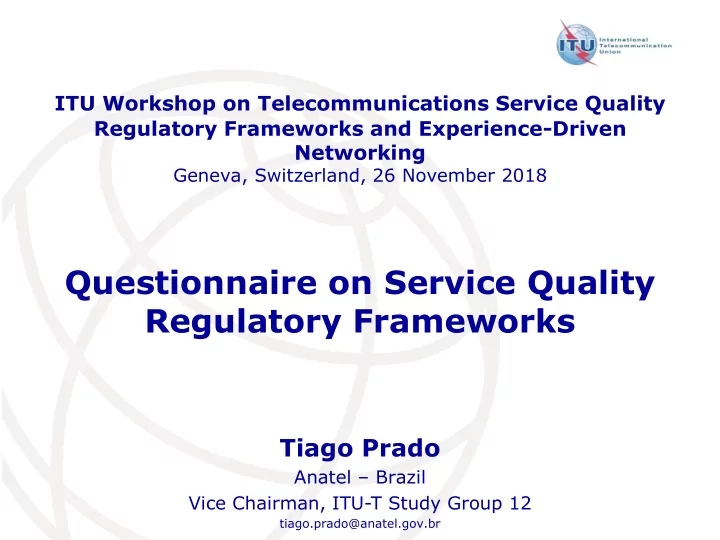

ITU Workshop on Telecommunications Service Quality Regulatory Frameworks and Experience-Driven Networking Geneva, Switzerland, 26 November 2018 Questionnaire on Service Quality Regulatory Frameworks Tiago Prado Anatel – Brazil Vice Chairman, ITU-T Study Group 12 tiago.prado@anatel.gov.br
2 Agenda WTSA-16 Resolution 95 The Questionnaire Objective and structure Respondents Key Findings
3 WTSA-16 Res. 95 Res. 95 – “ITU -T initiatives to raise awareness on best practices and policies related to service quality” Focus: defining how the studies related with quality regulatory approaches should be conducted on the next study period, indicating some deliverables to be developed by SG 12 and other relevant ITU-T Study Groups.
4 WTSA-16 Res. 95 Topics to be studied: Strategies to establish national quality measurement frameworks QoS/QoE evaluation scenarios, testing and sampling methodologies; References relating to minimal satisfactory KPIs Strategies to make users informed Identifying human and institutional capacity- building necessities of the countries; Promoting wider participation in the international debate on quality
5 WTSA-16 Res. 95 Recent work: Operational Plan for Res 95 implementation (TD681) Involves TSB, BDT, ITU-D SG1 and all SG12 Questions Many new work items approved in Q12/12 E.RQUAL E.QoSMgtMod E.MTSM E.QSimBox E.RQST G.CSFB E.CrowdESFB Etc.
6 WTSA-16 Res. 95 Recent work: Workshops to promote opened discussion Johannesburg, July - 2017 Rio de Janeiro, November - 2017 Dakar, March - 2018 Istanbul, September – 2018 Geneva, November – 2018 Questionnaire approved to collect information on QoS/QoE regulatory frameworks
7 Questionnaire TD347r1 (September, 2017): SG12 Plenary approved the Questionnaire. TSB Circular 62 (December, 2017) The Questionnaire was sent to all Member States. Final Report (November, 2018)
8 Questionnaire: objective and structure “The objective of this initiative is to collect information as input for the work of ITU-T SG12 in creating international references on national regulatory approaches and assist countries in deploying their quality regulatory framework” Section A High-level aspects of national quality regulatory frameworks Sections B and C QoS and QoE indicators, measurement, enforcement and publication strategies Section D Main issues to improve service quality How ITU could assist in establishing quality regulatory frameworks
9 Questionnaire: respondents Total: 53 countries
10 Questionnaire: respondents Total: 53 countries
11 Questionnaire: key findings Most countries (77%) have quality regulatory frameworks or obligations Most governments provide to their consumers options to present their complaints, in addition to the operators’ call centers
12 Questionnaire: key findings Only 21% of the countries indicated that consumers are regularly informed about quality by operators Regulatory frameworks are mostly focused in voice and broadband services Less focus on QoE than on QoS
13 Questionnaire: key findings More than 80% of the countries define indicators to track the quality of telecommunication networks 30 out of 31 countries who have quality indicators define minimum/maximum targets to be achieved by operators
14 Questionnaire: key findings Geographical breakdown and operator’s number of subscribers are the main criteria to differentiate QoS targets 22% of the countries do not request operators to notify the customers in cases of service interruption
15 Questionnaire: key findings Drive test and operators’ reports are still the most widely used strategies to measure QoS. However, probes and crowdsourcing are also well adopted Most countries measure the QoS of mobile networks yearly, while the fixed networks are mostly measured by month
16 Questionnaire: key findings Governments are mostly the ones in charge of performing the QoS measurements. However, operators and third-party entities are also common Almost 80% affirm that measurement methodologies are defined by regulators without any interaction with operators
17 Questionnaire: key findings Most of the countries do not have a statistical framework to measure the QoS at a national level The traditional approach of sanctioning operators is still the most common. However, a wide range of enforcement approaches are being used
18 Questionnaire: key findings 63% of the countries do not differentiate between perceived quality and consumer satisfaction models in their regulatory frameworks Approximately 60% of the countries are not using surveys to measure QoE
19 Questionnaire: key findings 70% of the countries confirmed that they publish QoS results Only 33% of the countries are publishing QoE results
20 Questionnaire: key findings QoS/QoE results are mostly published in regulator’s website, but social media and popular websites are also being used Yearly publication of the results is the most common approach, but the frequency of publication varies greatly among the countries
21 Questionnaire: key findings What are the main issues faced by your country related to the provision of acceptable service quality to consumers of telecommunications services? Lack of a quality legal/regulatory framework Lack of consumer awareness and empowerment Lack of basic facilities (e.g., electricity, security) Lack of trained human resources at the regulator
22 Questionnaire: key findings How could ITU assist your country in elaborating and implementing actions to improve service quality and keep consumers informed? Capacity-building / development programs Direct support / consultancy Seminars and Workshops Benchmark of national regulatory frameworks and measurement strategies
23 Questionnaire: key findings In which topics could international standards provide useful references for your country when establishing national quality regulatory frameworks? Regulatory definitions Indicator’s targets / thresholds Enforcement strategies Measurement methodologies Results publication effective approaches
24 Conclusions on this initiative Detailed survey (affects response rate)
25 Conclusions on this initiative Detailed survey (affects response rate) Succeed in gathering information from a wide number of countries Benchmark for any country interested in establishing or reviewing its QoS/QoE regulatory framework Informs ITU (T and D) on Member States main needs Will promote further discussion in SG 12 on new work items / future work
ITU Workshop on Telecommunication Service Quality Regulatory Frameworks and Experience-Driven Networking Geneva, Switzerland, 26 November 2018 Thank you! Tiago Prado Anatel – Brazil Vice Chairman, ITU-T Study Group 12 tiago.prado@anatel.gov.br
Recommend
More recommend